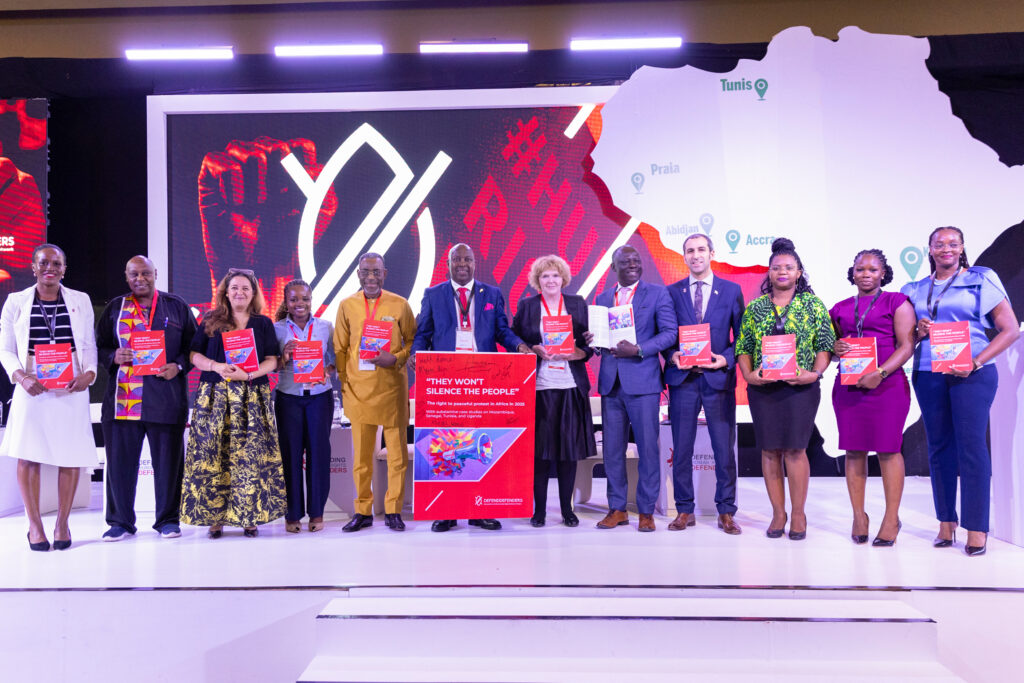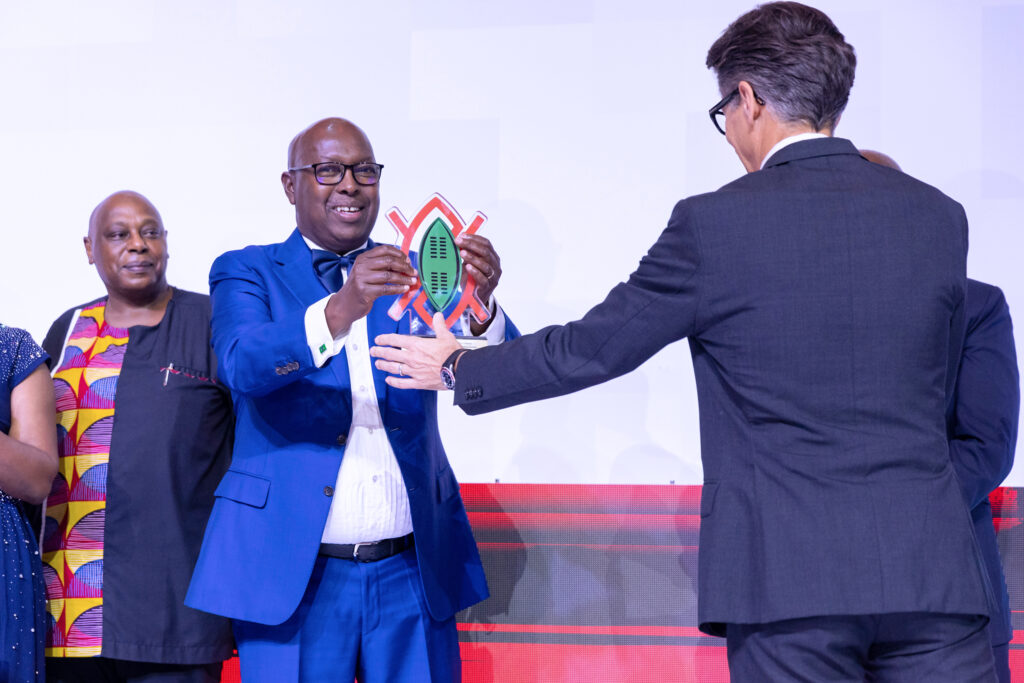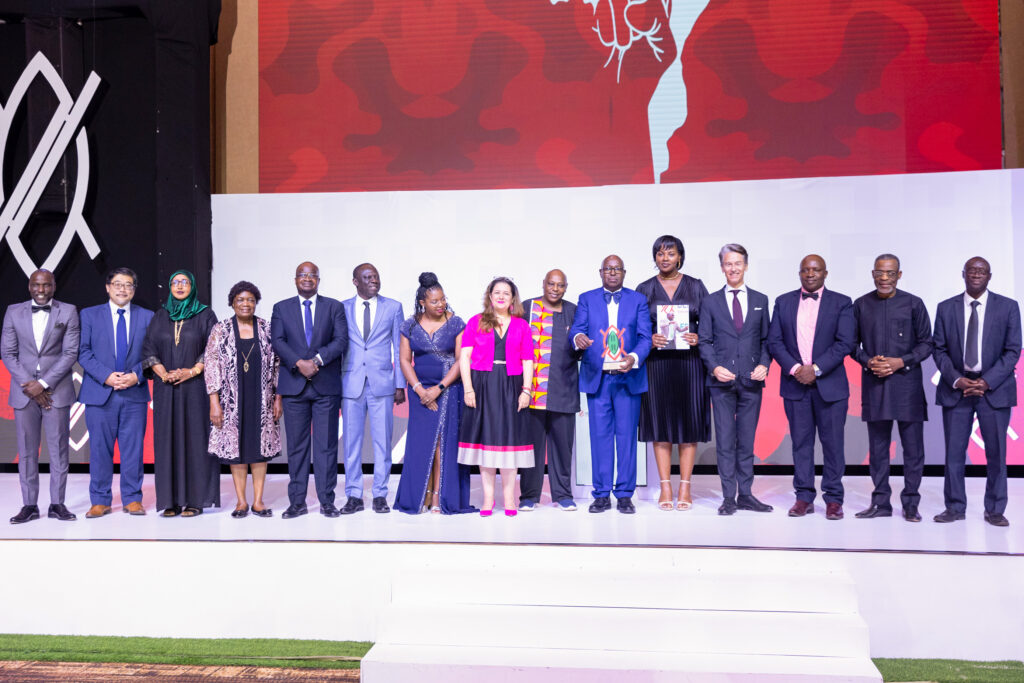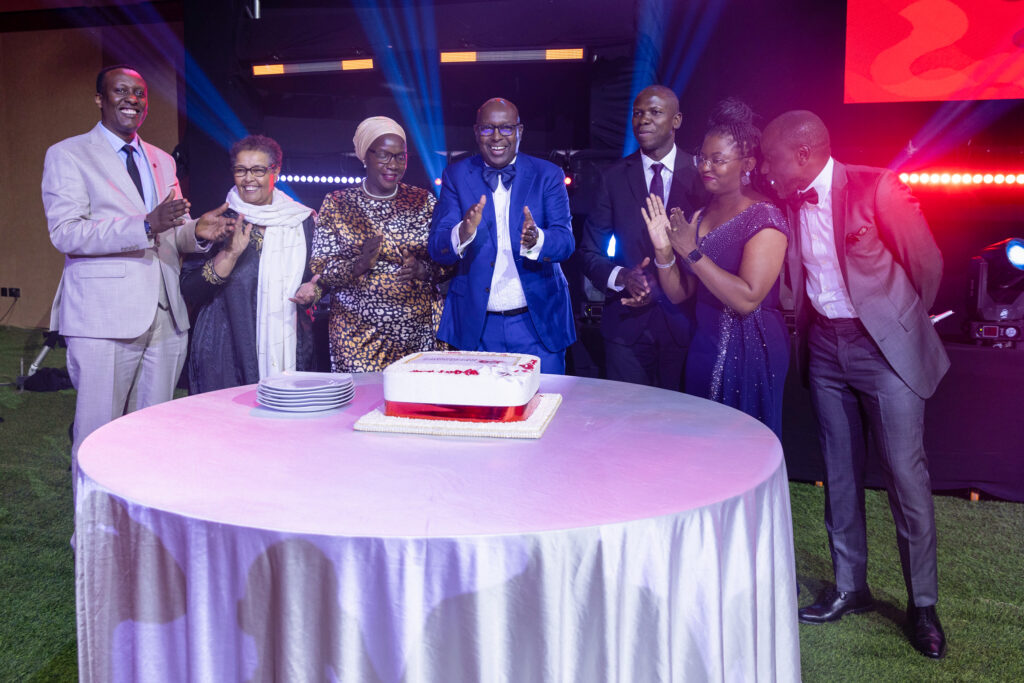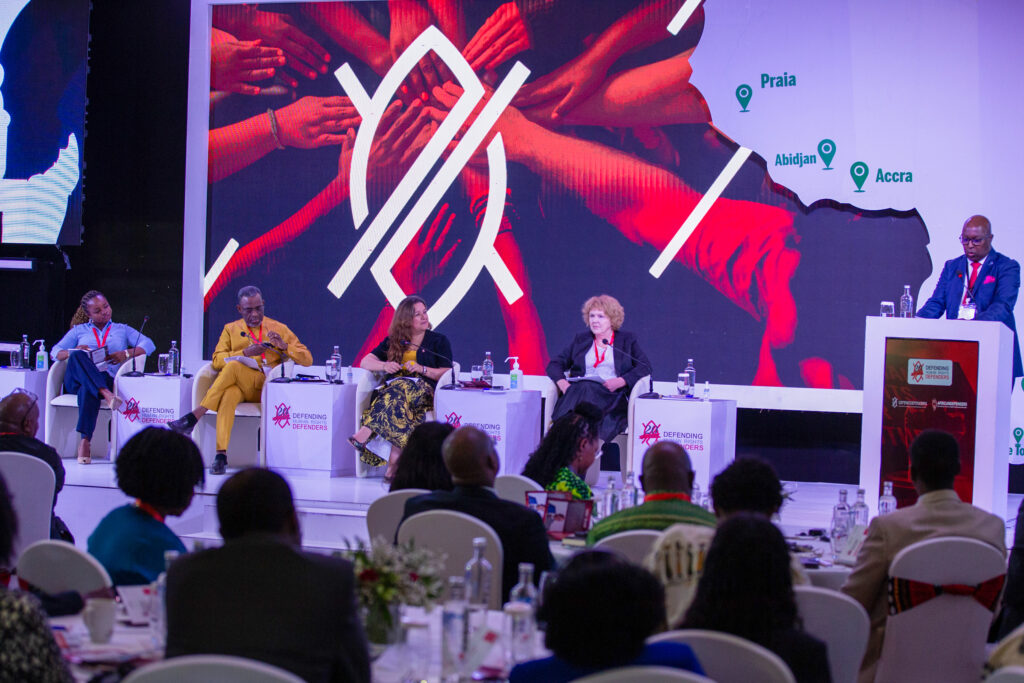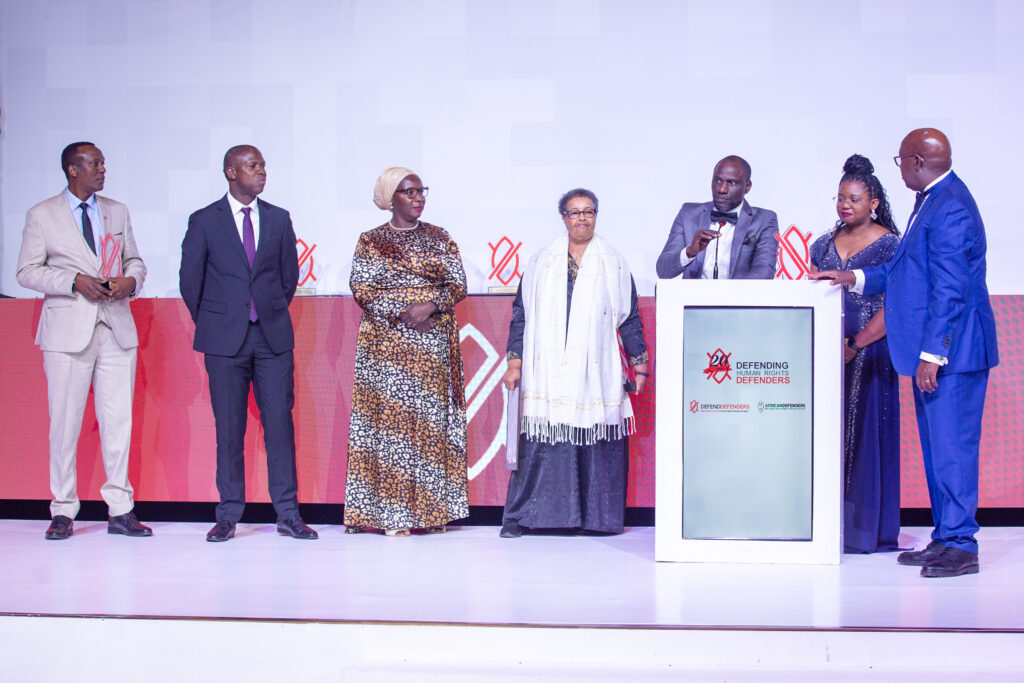DefendDefenders’ 20th anniversary celebrations
4-5 November 2025
Final communiqué
1. In celebration of 20 years dedicated to enhancing the safety and resilience of human rights defenders (HRDs) in Africa, DefendDefenders hosted a two-day convening at Speke Resort Munyonyo (Kampala) on 4 and 5 November 2025. The event brought together about 200 HRDs, including regional and global human rights experts, to reflect on two decades of defending human rights and to strategise on the future in an evolving global human rights context. The event visualised the critical work of HRDs, through exhibited impact stories, and honoured the contribution of those we have lost over the years.
2. The opening ceremony was moderated by Ms. Memory Bandera, Director of Programmes and Administration, DefendDefenders. In her remarks, she acknowledged the invaluable contributions of HRDs; both those present and those living in exile; whose courage and resilience continue to inspire our work.
3. In her remarks, Sophie Kyagulanyi, Chairperson of DefendDefenders’ Board, reflected on the organisation’s journey and growth. She expressed her delight at having witnessed its establishment in 2005 and its transformation from a regional initiative into a continental force for the protection, empowerment, and advocacy of HRDs across Africa and beyond. She noted that the anniversary was also about looking ahead, noting that the continent – though dynamic, young, and digitally connected – still witnesses widespread repression, insecurity, shrinking civic space, and undemocratic practices.
4. Hassan Shire, Executive Director, DefendDefenders and Chairperson, AfricanDefenders (Pan-African Human Rights Defenders Network), delivered opening remarks, appreciating all those who have been part of our journey over the past two decades. He also took a moment to appreciate the unwavering support of our development partners, noting: “We would not have come this far without the strategic partnership of our development partners, who have invested heavily in our work over the past 20 years”.
5. Hassan Shire further highlighted the milestones recorded over 20 years of substantial investment in safeguarding lives and ensuring the security of HRDs. Since 2005, DefendDefenders has provided emergency protection grants to 10,315 individuals (with 9,433 family members benefiting from this support); relocating 657 HRDs under the Ubuntu Hub Cities relocation program; trained over 10,000 HRDs; and delivered nearly 5,000 training sessions in digital and physical security. He noted that the organisation spearheaded 201 high-level advocacy engagements at both regional and international platforms; and published 67 research reports. He further noted that beyond the numbers we are displaying, these are human faces. What sustains DefendDefenders’ resolve are the profound stories, testimonies, and feedback from the HRDs. Through the organisation’s protection programs, we encounter individuals whose lives embody resilience.
6. Mariam Wangadya, Chairperson of the Uganda Human Rights Commission (UHRC), opened the anniversary celebrations and emphasised the significance of DefendDefenders’ work over the past two decades. She highlighted the vital role of HRDs, noting that without their protection, the flame of freedom risks being extinguished. In her concluding remarks, she reflected on the transformative power of HRDs: “Every human rights defender carries the torch of justice, transforming fear into courage and despair into action. Their work reminds us that human dignity is not a privilege, but a universal right.”
7. Following a coffee break, participants reconvened for a high-level panel discussion, “Standing Strong: Reimagining Safety and Solidarity for Human Rights Defenders in Shifting Global Ecosystems.” The discussion was moderated by Hassan Shire. Panelists included Mary Lawlor, United Nations (UN) Special Rapporteur on the situation of HRDs; Gina Romero, UN Special Rapporteur on the rights to freedom of peaceful assembly and of association (FoAA); Marcel Akpovo, UN High Commissioner for Human Rights (OHCHR) Regional Director for Eastern and Southern Africa and Representative to the African Union (AU); and Rinu Oduala, Executive Director of the Marigold RO Foundation and woman HRD from Nigeria.
8. Hassan Shire pened the discussion by outlining key achievements and examining the complex challenges that HRDs encounter in an increasingly dynamic environment—particularly as shifting geopolitical contexts impact funding opportunities for the human rights movement.Against this backdrop, he paused a pertinent question, what innovative practices and models are proving effective in enhancing the safety and resilience of HRDs?
9. According to Mary Lawlor, while constitutions, treaties, and mechanisms are in place to protect HRDs, true progress occurs when communities are empowered to drive solutions that achieve lasting justice and peace. In her remarks, she also addressed the issue of whether international commitments towards HRDs are getting stronger or weaker. She reflected: “The international system itself is inconsistent. States often promote the protection of HRDs when it aligns with their political or strategic interests. Some countries support their allies while ignoring [their] abuses, creating a sense of double standards. As one Algerian defender told [her]: ‘When grave violations are met with silence, defenders question whether accountability truly apply to all.’” Mary Lawlor added that she was encouraged by the development of local, national and regional HRD networks that have emerged across Africa over the past ten years.
10. Gina Romero focused on freedoms of peaceful assembly and association, highlighting that states’ core responsibility is not only to refrain from interference but also to actively protect these rights. She noted that national practices and inconsistencies across regional and global protection mechanisms undermine rights and universality. Some governments adopt narrow interpretations standards, curtailing people’s enjoyment of their human rights. She also observed that restrictions are increasing across the world, with states stigmatising, harassing and criminalising dissent (sometimes taking revenge against specific actors), weakening civil society actors, and suppressing peaceful protests. This resonated with findings of DefendDefenders’ latest report (see below).
11. Marcel Akpovo observed that, across Africa, there is a growing recognition of the importance of UN institutions and the engagement of regional and international leaders. Many states have ratified instruments and established frameworks to meet their human rights obligations. However, ratification alone is not enough – one of the persistent challenges is implementation. To support states, he recommended adopting a constructive, cooperative approach that includes capacity-building, technical cooperation, and dialogue. He stressed the need to strengthen national ownership of human rights obligations: when states view human rights not as an external imposition but as an integral part of development, peace, and governance, they are more likely to invest in meeting their international commitments.
12. Rinu Oduala reflected on the panel discussion’s theme and emphasised that, for emerging HRDs, this means continuing despite the fear and persevering even when fear is an inherent part of the work. It is sad that HRDs, while striving to protect human rights, are often the first victims of human rights abuses themselves. Many of the strategies they have been forced to adopt, such as leaving their countries to protect their families or keep them from harm, reflect the difficult realities they face. She stressed, however, the vital and growing role of youths and young HRD across the African continent.
13. Following a Q&A session and concluding remarks by panelists, Hassan Shire asked Estella Kansiime, DefendDefenders’ Advocacy, Research and Communications Manager, to present DefendDefenders’ latest report, titled “‘They Won’t Silence the People’: The right to peaceful protest in Africa in 2025 — with substantive case studies on Mozambique, Senegal, Tunisia, and Uganda.”
14. In this report, DefendDefenders studies peaceful protests across the African continent. The report examines the value of peaceful protests as a vital tool for democratic participation, international and African human rights standards, the scope of the right to protest, and trends across Africa (the “big picture”). It then thoroughly assesses the situation in four focus countries, namely Mozambique, Senegal, Tunisia, and Uganda, with comparative analyses highlighting both patterns of violations and good practices. This report marks the end of an ambitious research effort throughout DefendDefenders’ 20th year of existence, 2025.
15. To crown off Day One (4 November 2025), DefendDefenders hosted all the distinguished guests to a reception with Memory Bandera and Joseph Bikanda (Coordinator, AfricanDefenders) as masters of ceremony. The reception featured powerful testimonials from defenders who have stood firm in the face of adversity, sharing stories of courage, solidarity, and impact. DefendDefenders also launched an Endowment Fund and Mentorship Programme; key initiatives aimed at ensuring the sustainability, protection, and growth of human rights work for generations to come.
16. In his remarks, H.E. Jan Sadek, the European Union (EU) Ambassador to Uganda, expressed the EU’s delight in having walked alongside DefendDefenders in protecting and promoting the work of HRDs since 2012 through saving lives, strengthening organisations, and ensuring that defenders never stand alone. He commended the partnership grounded in African leadership and European solidarity, and a shared belief that human rights can never be negotiated. Acknowledging the growing challenges, he noted that HRDs around the world continue to face violations of their rights, torture, arbitrary arrest and detention, and harassment. Civic space is shrinking, digital harassment is rising, and justice is too often left behind.
17. During the reception, Hassan Shire, was awarded with a Lifetime Achievement Award, recognising his contribution to the growth of the human rights movement in Africa. DefendDefenders also recognised its Board members, for their oversight and strategic guidance in ensuring DefendDefenders effectively delivers on its mandate, as well as recognising founding members with certificates.
18. Day Two (5 November 2025) opened with a round table discussion: “Navigating Global Uncertainties,” focused on enhancing intergenerational learning and synergy among HRDs in Africa, moderated by Tabitha Netuwa, DefendDefenders’ Senior Manager, Protection and Security Management. Participants were clustered according to five key groups, namely: Protection and Resilience in Restrictive Environments; Digital Activism and Security in a Changing World; Youth Leadership, Mentorship, and Movement Building; Inclusion, Diversity, and Women’s Leadership in the Human Rights Movement; and Advocacy, Civic Space, and Regional Solidarity. They engaged in discussions aimed at fostering dialogue, learning, and collaboration between generations of HRDs, empowering them to adapt, innovate, and build resilience in an evolving civic and political landscape. Each group addressed the specific themes under the guidance of facilitators who ensured inclusivity, and active participation. It concluded with a plenary session where groups presented their key takeaways and recommendations.
19. This was followed by an interactive panel discussion to reflect on human rights in the 21st century moderated by Ryota Jonen, Initiator of Demos Kratos. The panelists included Maina Kiai, Chairperson, Kenyan Human Rights Commission and former UN Special Rapporteur on FoAA, Clément Voule, former UN Special Rapporteur on FoAA, and Gina Romero the current Special Rapporteur on FoAA.
20. The panel examined the UN human rights framework—reflecting on where the system has been effective, what continues to work, and where its limitations lie. The panelists also reimagined the principles of the Universal Declaration of Human Rights through the lens of solidarity and collective responsibility. It was a thought-provoking discussion that inspired reflection on the evolving role of the human rights mechanisms in today’s complex global landscape and the engagement of it with the emerging human rights defenders.
21. Participants reconvened in the afternoon breaking out into parallel sessions. One focused on the consultation for the upcoming report on digital surveillance and its chilling effects that is being drafted by Gina Romero. The second session on Roots of Resilience, the mentorship programme launched during the reception hosted on the evening of 4 November 2025. The discussion highlighted the initiative’s goal of strengthening intergenerational learning and supporting emerging human rights defenders through mentorship, guidance, and shared experience.
22. Hassan Shire closed the two-day convening marking DefendDefenders’ 20th Anniversary celebrations with words of gratitude and reflection. He thanked all participants who took time out of their busy schedules to celebrate, reflect, and reimagine the future of human rights work in Africa and beyond. Amidst the celebrations, he was reminded of the challenges faced by HRDs two decades ago recalling colleagues from Ethiopia who were unable to return home after the very first conference. This, he noted, ties directly to the discussions from the high-level panel held on 4 November: while constitutions, treaties, and mechanisms are designed to protect HRDs, real progress does not occur automatically. Inconsistent practices within countries and across regions continue to undermine the universality of human rights.
23. He concluded by noting the significance of DefendDefenders hosting three successive UN Special Rapporteurs on the same mandate—past and present—alongside grassroots defenders, symbolising continuity, resilience, and solidarity across generations.
GALLERY
